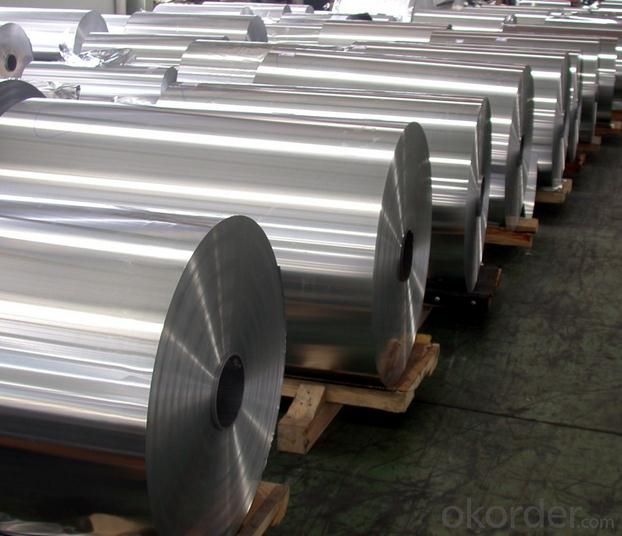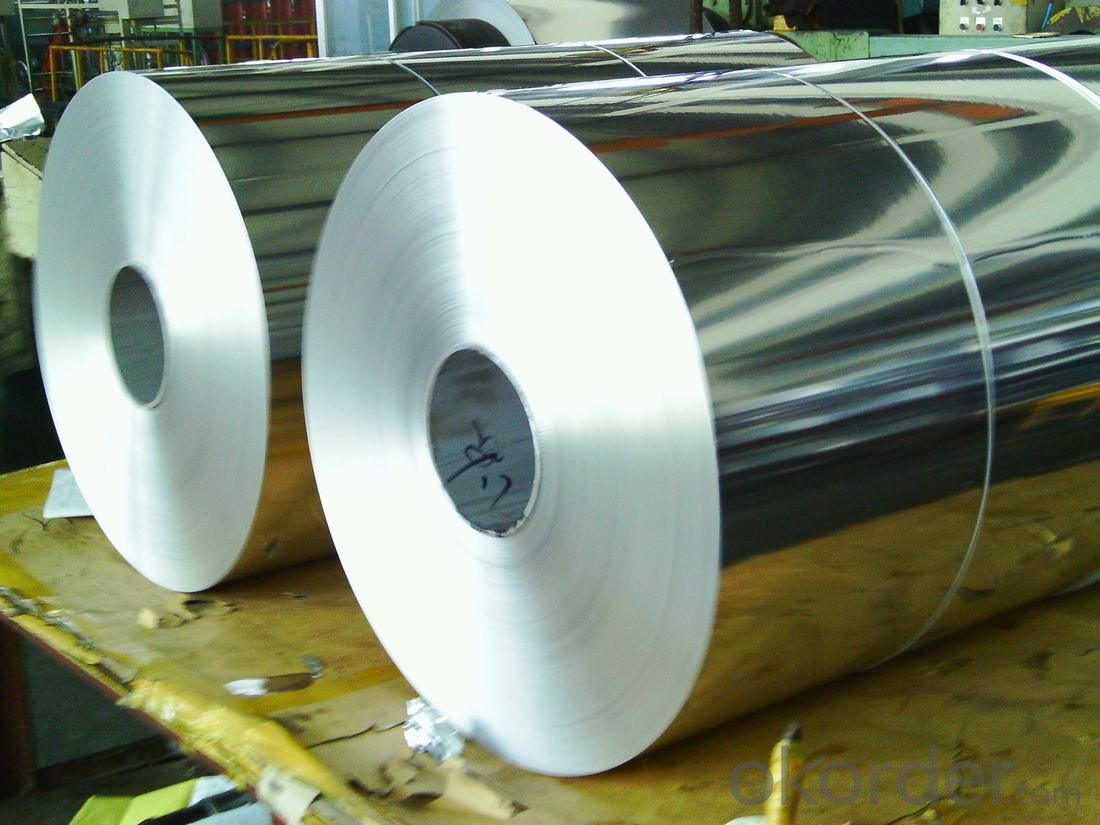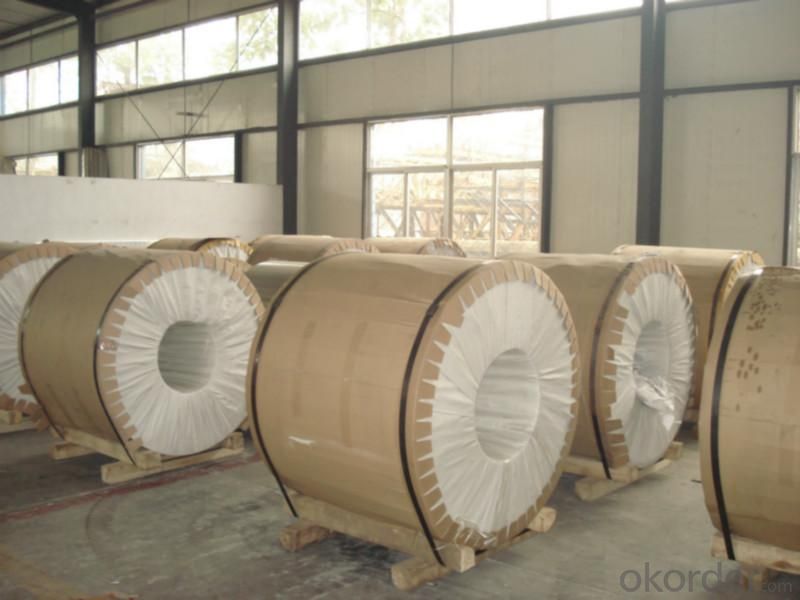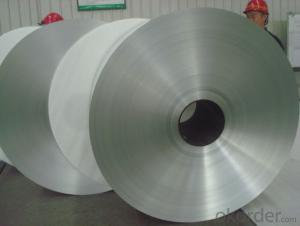ASTM Grade 8079 Aluminum Strips Belt For Solar
- Loading Port:
- Shanghai
- Payment Terms:
- TT OR LC
- Min Order Qty:
- 5 m.t.
- Supply Capability:
- 500 m.t./month
OKorder Service Pledge
OKorder Financial Service
You Might Also Like
Item specifice
ASTM Grade 8079 Aluminum Strips Belt For Solar
aluminum coil specifications:
1) Alloy :1050, 1060,1100, 3003 3004 3105 3A21 5005 5052 etc
2) Temper: O/H12/H14/H1/H18/H32/H34/H36/H38//H111/H112/H116/H321/T6/T651/T3/T351 etc
3) Thickness: 0.1mm to 6mm
4) Width:20mm to 3300mm
5)Coil weight: 100kgs to 6 tons depends on actual requirement
6)Core material: Aluminum or paper
7)Coil Inner diameter: 75mm, 150mm, 200mm, 300mm, 405mm, 505mm or as required
8) Protective film can be added
item | 3003 Aluminum coil | |
Standard | GB/T3190-2008,GB/T3880-2006,ASTM B209,JIS H4000-2006,etc | |
Material | 1060,1050,1100 3003,3103,3004,3005,3105 5052, 5454,5754 | |
Size | Thickness | 0.5mm-3.5mm |
Width | 800-1500mm | |
Weight/Roll | About 1.5MT/3MT | |
Quality control | Mill Test Certificate is supplied with shipment, Third Part Inspection is acceptable. | |
Surface | Bright, polished, hair line, brush, checkered, embossed, etc | |
Trade terms | Price term | ,FOB, CNF, CIF, etc |
Payment Term | TT,L/C | |
MOQ | 2MT | |
20 GP Capacity | About 20-25MT | |
Delivery time | 1.The products will delivery immediately after receiving the payment. 2.According to the order quantity, prompt delivery. | |
Export to | Ireland,Singapore,Indonesia,Ukraine,Spain,Canada,USA,Brazil,Thailand,Korea,Iran,India,Egypt,Kuwait, Oman,Viet Nam, South Africa, Dubai, Russia, etc | |
Package | Stick blue film→plastic film→waterproof paper→1~2 tons on a export standard pallet(corner protection) | |
Application | 1)Further making utensil.2)Solar reflective film3)The appearance of the building4)Interior decorating:ceilings,walls,etc.5)Furniture cabinets6)Elevator decoraction7)Signs,nameplate,bags making.8)Decoration inside and outside the car9)Household appliances:refrigerators,microwave ovens,audio equipment,etc.10)The consumer electronics:mobile phones,digital cameras,MP3,etc. | |



- Q:What are the common surface finishes for aluminum coils in the electrical industry?
- In the electrical industry, aluminum coils are commonly used for various applications such as transformers, motors, and electrical enclosures. These coils are often subjected to different surface finishing processes to enhance their performance and longevity. One of the most common surface finishes for aluminum coils in the electrical industry is anodizing. Anodizing involves creating a protective oxide layer on the surface of the aluminum through an electrochemical process. This layer not only provides excellent corrosion resistance but also improves the coil's durability and electrical insulation properties. Another popular surface finish is chemical conversion coating, also known as chromate conversion coating. This process involves treating the aluminum surface with a chemical solution to create a thin layer of protective coating. The coating not only provides corrosion resistance but also improves the adhesion of subsequent coatings or paints applied to the coil. Powder coating is another common surface finish used in the electrical industry for aluminum coils. It involves applying a dry powder onto the coil's surface and then curing it under heat to create a durable and attractive finish. Powder coating provides excellent resistance to chipping, scratching, and fading, making it ideal for applications where aesthetics and durability are important. In addition to these surface finishes, aluminum coils in the electrical industry may also undergo other treatments such as lacquering or painting. Lacquering involves applying a clear protective coating to the coil's surface, providing a glossy and protective finish. Painting, on the other hand, involves applying a colored coating to the surface for aesthetic purposes while also providing protection against corrosion. Overall, the choice of surface finish for aluminum coils in the electrical industry depends on the specific requirements of the application. Factors such as corrosion resistance, electrical insulation, durability, and aesthetics play a significant role in determining the most suitable surface finish for a given application.
- Q:It's time for a new bike and I don't know enough about the pros and cons of aluminum vs. carbon fiber. I can get a low-end carbon bike or a high-end aluminum for about the same price, so the budget is not really a major issue. Any opinions would be appreciated.
- carbon is normally lighter but i would prefer the high end aluminum
- Q:What are the common sizes and dimensions of aluminum coils?
- The common sizes and dimensions of aluminum coils vary depending on the specific application and industry requirements. However, some commonly used sizes include widths ranging from 2 inches to 60 inches and thicknesses ranging from 0.008 inches to 0.25 inches. The length of the coils can vary as well, depending on the customer's needs.
- Q:What is the flexural strength of aluminum coils?
- The flexural strength of aluminum coils can differ based on several factors, including the alloy employed, tempering procedure, and coil thickness. Generally, aluminum alloys showcase commendable flexural strength, rendering them appropriate for applications necessitating bending or flexing. Nevertheless, it is crucial to acknowledge that the flexural strength of aluminum coils is typically inferior to that of steel or other metals. To ascertain the precise flexural strength of a particular aluminum coil, one must consult the manufacturer's specifications or perform specific tests in compliance with applicable standards.
- Q:Are aluminum coils suitable for heat exchanger fins?
- Yes, aluminum coils are suitable for heat exchanger fins. Aluminum is a lightweight and highly conductive material, making it an excellent choice for heat transfer applications. The high thermal conductivity of aluminum allows for efficient heat exchange between the fins and the surrounding air or fluid. Additionally, aluminum has good corrosion resistance properties, which is important for heat exchangers that are exposed to moisture or harsh environments. The use of aluminum coils in heat exchanger fins also offers advantages such as high strength, durability, and ease of fabrication. Overall, aluminum coils are a popular and effective choice for heat exchanger fins due to their excellent thermal conductivity, corrosion resistance, and other beneficial properties.
- Q:Are aluminum coils resistant to mold and mildew?
- Yes, aluminum coils are generally resistant to mold and mildew. Aluminum is a non-porous material, which means it does not absorb moisture like other materials such as wood or fabric. This makes it less susceptible to mold and mildew growth. Additionally, aluminum coils are often coated with protective finishes that further enhance their resistance to mold and mildew. However, it is important to note that while aluminum coils are less prone to mold and mildew, they are not completely immune. If the coils are exposed to excessive moisture or humidity, mold and mildew can still develop. Regular cleaning and maintenance are therefore necessary to prevent any potential mold or mildew growth.
- Q:Are aluminum coils easy to bend and shape?
- Yes, aluminum coils are relatively easy to bend and shape due to their malleability and ductility.
- Q:What are the common transportation methods for aluminum coils?
- Aluminum coils can be transported using various methods such as trucking, rail, and shipping. When prompt delivery or short distances are involved, trucking is commonly employed. To ensure secure transit, aluminum coils are loaded onto specialized trailers equipped with cradles or coil racks. This approach provides flexibility and easy access to different locations. For long-distance shipments, rail transportation is frequently utilized. Railcars specifically designed to accommodate the weight and dimensions of aluminum coils are used for loading. This transportation method is advantageous due to its cost-effectiveness and ability to transport large quantities of coils in a single shipment. When it comes to international shipments, shipping by sea is a popular choice. Aluminum coils can be loaded onto cargo ships either in specialized containers or directly on the ship's deck. Shipping offers the benefit of transporting large volumes of coils over long distances and is often preferred for global distribution due to its efficiency and cost-effectiveness. Ultimately, the choice of transportation method for aluminum coils depends on factors such as distance, urgency, quantity, and destination. Companies must carefully consider these factors in order to determine the most suitable transportation method for their specific needs.
- Q:Can aluminum coils be used in roofing applications?
- Aluminum coils are indeed suitable for roofing purposes. The lightweight, corrosion-resistant, and durable properties of aluminum make it a popular option for roofing. In the construction of various roofing systems like standing seam roofs, metal shingles, and flat roofs, aluminum coils are commonly utilized. These coils are typically shaped into panels or sheets, which are then installed on the roof, offering protection against weather conditions and enhancing the overall appearance of the building. Moreover, the reflective attributes of aluminum play a role in reducing energy consumption. By deflecting sunlight and heat, this environmentally friendly roofing choice helps in conserving energy.
- Q:Can aluminum coils be used in high-pressure or high-temperature environments?
- High-pressure or high-temperature environments typically do not recommend the use of aluminum coils. Although aluminum is known for its high thermal conductivity and resistance to corrosion, it has limitations when exposed to extreme conditions. When it comes to high-pressure environments, aluminum coils may lack the necessary strength and durability required to withstand the forces exerted by pressurized systems. Aluminum has a lower tensile strength compared to metals like steel or titanium, making it more vulnerable to deformation or failure under high pressure. Therefore, it is generally advisable to use materials with higher strength and pressure ratings in such situations. Likewise, aluminum coils have a relatively low melting point compared to metals such as steel or copper. Aluminum's melting point is approximately 660 degrees Celsius (1220 degrees Fahrenheit), which makes it susceptible to damage or failure in high-temperature environments. For applications where the temperature exceeds the melting point of aluminum, it is recommended to use materials with higher temperature resistance. However, it is important to note that there are specialized alloys and coatings available that can enhance the high-temperature and high-pressure capabilities of aluminum. These modifications can improve its strength, heat resistance, and corrosion resistance, making it suitable for certain applications in extreme conditions. Nevertheless, it is crucial to carefully consider the specific requirements and limitations of the intended environment before deciding to use aluminum coils. Seeking advice from experts and considering alternative materials may be necessary to ensure the safety and efficiency of the system.
1. Manufacturer Overview |
|
|---|---|
| Location | |
| Year Established | |
| Annual Output Value | |
| Main Markets | |
| Company Certifications | |
2. Manufacturer Certificates |
|
|---|---|
| a) Certification Name | |
| Range | |
| Reference | |
| Validity Period | |
3. Manufacturer Capability |
|
|---|---|
| a)Trade Capacity | |
| Nearest Port | |
| Export Percentage | |
| No.of Employees in Trade Department | |
| Language Spoken: | |
| b)Factory Information | |
| Factory Size: | |
| No. of Production Lines | |
| Contract Manufacturing | |
| Product Price Range | |
Send your message to us
ASTM Grade 8079 Aluminum Strips Belt For Solar
- Loading Port:
- Shanghai
- Payment Terms:
- TT OR LC
- Min Order Qty:
- 5 m.t.
- Supply Capability:
- 500 m.t./month
OKorder Service Pledge
OKorder Financial Service
Similar products
New products
Hot products
Related keywords





























